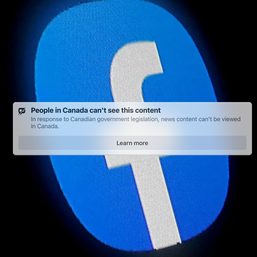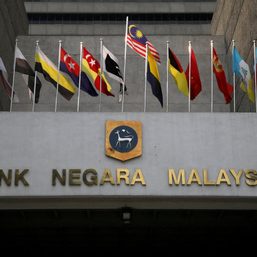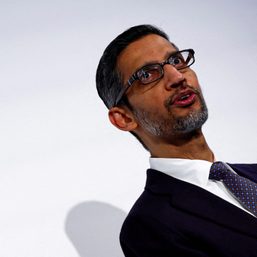SUMMARY
This is AI generated summarization, which may have errors. For context, always refer to the full article.

Multiple countries have tried to push big US technology companies Facebook and Google to pay news publishers for using their content. Now, Australia is set to pass a law forcing these tech giants to pay media outlets in a landmark move that will be watched globally.
Will this finally succeed in reining in big tech, which has fended off calls for greater regulation over their anti-competitive behavior?
As Facebook’s popular relationship status says, it’s complicated.
“It is difficult to say at this time how the regulatory attempts will play out. Many countries have tried different approaches over time, but only recently have they become more structured and clearer in formulating new regulations across the board,” Sarah Ganter, a Simon Frasier University professor focusing on media governance and policy in the digital era, told Rappler in an e-mail interview.
Australia’s pending law: New global standard?
Australia’s initiative has been closely watched around the globe as news media suffer in an increasingly digital economy where big tech firms capture advertising revenue. The coronavirus pandemic has exacerbated the problem for global newsrooms.
Under Australia’s draft code, which is expected to be passed this year, tech companies will be required to negotiate with news firms “in good faith” over payments for use of their content.
If agreement cannot be reached within 3 months, the issue will go to binding arbitration to determine the amount of payments.
The code also requires tech companies to provide advance notice of algorithm changes affecting news ranking and transparency over advertising run against news content.
David Chavern, CEO of News Media Alliance, a nonprofit organization representing nearly 2,000 newspapers and their multi-platform businesses in the US, welcomed Australia’s move.
“A few digital platforms make up the rules and serve as the gatekeepers to all of this information, depriving publishers of vital data and revenue and leaving them with little to no bargaining power to protect and monetize their content,” Chavern said in a statement.
“This is an encouraging first step toward a compensation framework to ensure we are adequately compensated for our content, and serves as an example for other countries around the world to follow,” he added.
For the longest time, Facebook and Google have strongly opposed moves forcing them to share advertising revenue, hinting they could simply boycott Australian media – similar to what Google did in Spain – if mandatory payments are imposed.
But Australian Treasurer Josh Frydenberg warned that the code would prohibit any “discrimination” against Australian media by the tech companies.
“Today’s draft legislation will draw the attention of many regulatory agencies and many governments around the world,” Frydenberg said, calling the initiative a “world-leading regulatory framework.”
France
The European Union was the first to run after tech giants. The EU passed tougher copyright rules requiring online platforms to sign licensing agreements with authors, musicians, and journalists to use their work. Member countries now have to transpose this into law.
For Google, this meant they have to pay news snippets; while other sharing platforms would have to filter posts with copyrighted materials.
France was the first EU country to pass this into law. However, instead of paying French publishers for reusing their content, Google stopped displaying those covered by the law – a move the competition watchdog slammed as abuse of dominant market position. (READ: Google deals blow to EU copyright law in France)
Just last April, France’s competition watchdog ordered Google to negotiate “in good faith” with French publishers after the company refused to strike deals with them.
Germany, Spain
Germany and Spain previously attempted to extract payments for publishers from Google but to no avail.
In Spain, for example, Google just chose to pull the plug on its Google News service instead of paying news publishers. The service remains closed to date.
“Legislation in Spain requires every Spanish publication to charge services like Google News for showing even the smallest snippet from their publications, whether they want to or not. This approach is not sustainable for Google News,” the company said on its website.
A 2019 report by the News Media Alliance said that “data showing online website traffic trends for Spanish news sites from 2014 up to 2019 seem to have remained largely unchanged, with the total number of unique monthly visitors actually increasing with many publishers.”
In Germany, biggest news publisher Axel Springer eventually gave in and allowed Google to run excerpts of its articles after its sites’ traffic decreased.
Recently, however, 4 big German publishing groups, including Axel Springer, took it upon themselves and joined forces to fight the market power of Google, Facebook, and Amazon.
According to digital media company DigiDay, the goal was “to actively pull media agency and direct-advertiser investment from the platforms into the media groups’ pots.”
“Ad alliance executives will seek to lock in negotiated, custom, annual agreements with media agencies and advertisers that want to work directly with the publishers,” the report stated.
Germany’s top court also ordered Facebook to curb data collection from its users, opening the possibility of treating Facebook’s massive data collection as a violation of antitrust laws – a claim Facebook repeatedly denied.
Where’s the US in all of this?
With all these, many hope that the US will follow next. But will they?
William Kovacic, former US Federal Trade Commission chair, told Forbes: “I think the US does not have credibility in the international debate if it is not carrying out its own cases and otherwise making adjustments of its regulatory framework to address new phenomena.”
There is still a long way to go. The CEOs of the 4 biggest tech companies, all Americans, recently faced a landmark congressional antitrust hearing, where they emphasized their contributions to the US economy while downplaying their power. They attributed their success to America’s innovation culture and lack of government intervention.
Representative Pramila Jayapal (D-WA) likened Google’s ad exchange to a stock market without regulation, which she said, allows Google to abuse its market power at the expense of journalists.
Google CEO Sundar Pichai denied this, saying the company is “deeply committed to journalism” and that its business with news publishers remains a “low margin business” for them. Google has repeatedly argued that its referral traffic is a huge advantage to publishers, without addressing its own dominance in the digital ad system.
Chavern said the US Congress should now pass the Journalism Competition and Preservation Act, which would allow publishers to negotiate rates with Google as a group.
Baby steps: Better than nothing?
After years of blocking efforts and with multiple countries now running after them, Google and Facebook were somehow forced to adjust – still, of course, on their own terms.
In 2019, Facebook launched a separate news tab in its mobile app in the US, with the company paying some of the publishers for their work. Since it’s in a different tab, the content would not automatically appear in users’ news feed as the audience would have to click on the tab. It remains to be seen if this would be successful or not.
For its part, Google announced in June 2020 that it will pay for “high-quality content” from select publishers as part of a new program that will be released later this year on its Google News and Discover services.
Google says it could also offer free access to paywalled articles, or articles that can only be viewed by a subscriber, by paying publishers on the user’s behalf. But more details are still unknown.
Google will start the program with chosen publishers in Germany, Australia, and Brazil. According to the Financial Times, these include Der Spiegel in Germany and Schwartz Media in Australia.
For Ganter, such actions could help news organizations “recover in an increasingly difficult” media climate. But these, she added, are not enough.
“The attempts to get Google and Facebook to pay for the news contents that they have been monetizing on have been long enduring and should they be set up under the right premises and implemented consequently, will make an important contribution to helping news organizations recover in an increasingly difficult media economy,” Ganter told Rappler.
“However, this can only be one approach of many. Some countries started for example to subsidy news subscriptions, others introduce or expand funding mechanisms that are at arms length from their governments and that aim at particularly supporting local news,” she added.
Ultimately, she said, news groups have to strategize and learn from their mistakes “to be able to remain relevant and thus sustainable in the future.” – with reports from Agence France Presse/Rappler.com
Add a comment
How does this make you feel?














There are no comments yet. Add your comment to start the conversation.